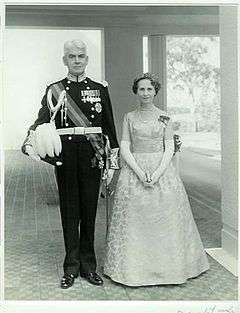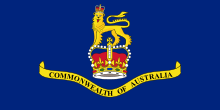William Morrison, 1st Viscount Dunrossil
| The Right Honourable The Viscount Dunrossil GCMG, MC, KStJ, PC, QC | |
|---|---|
 | |
| 14th Governor-General of Australia | |
|
In office 2 February 1960 – 3 February 1961 | |
| Monarch | Elizabeth II |
| Prime Minister | Robert Menzies |
| Preceded by | Sir William Slim |
| Succeeded by | The Viscount De L'Isle |
| Speaker of the House of Commons | |
|
In office 31 October 1951 – 19 September 1959 | |
| Monarch |
George VI (1951–52) Elizabeth II (1952–59) |
| Preceded by | Sir Douglas Clifton Brown |
| Succeeded by | Sir Harry Hylton-Foster |
| Postmaster General | |
|
In office 15 May 1940 – 1942 | |
| Monarch | George VI |
| Prime Minister | Winston Churchill |
| Preceded by | George Tryon |
| Succeeded by | Harry Crookshank |
| Chancellor of the Duchy of Lancaster | |
|
In office 29 January 1939 – 3 April 1940 | |
| Monarch | George VI |
| Prime Minister | Neville Chamberlain |
| Preceded by | The Earl Winterton |
| Succeeded by | George Tryon |
| Minister of Food | |
|
In office 4 September 1939 – 3 April 1940 | |
| Monarch | George VI |
| Prime Minister | Neville Chamberlain |
| Preceded by |
Office Established Charles McCurdy as Minister of Food Control, 1921 |
| Succeeded by | The Lord Woolton |
| Minister of Agriculture, Fisheries and Food | |
|
In office 29 October 1936 – 29 January 1939 | |
| Monarch |
Edward VIII (1936) George VI (1936–39) |
| Prime Minister | Stanley Baldwin |
| Preceded by | Walter Elliot |
| Succeeded by | Sir Reginald Dorman-Smith |
| Personal details | |
| Born |
William Shepherd Morrison 10 August 1893 Torinturk, Scotland |
| Died |
3 February 1961 (aged 67) Canberra, Australia |
| Resting place | St John the Baptist Church, Reid |
| Nationality | British |
| Political party | Conservative |
William Shepherd Morrison, 1st Viscount Dunrossil GCMG, MC, KStJ, PC, QC (10 August 1893 – 3 February 1961) was a British Conservative politician who served as Speaker of the House of Commons and the 14th Governor-General of Australia.
Early life
Morrison was born in Scotland and educated at George Watson's College and the University of Edinburgh. He joined the British Army as an officer in the First World War and served with an artillery regiment in France, where he won the Military Cross.[1] In 1919 he left the Army with the rank of Captain. He was elected to the House of Commons as Conservative Member of Parliament (MP) for Cirencester and Tewkesbury in 1929. In Parliament he acquired the nickname "Shakes", from his habit of quoting from the works of William Shakespeare.
Ministerial career
Morrison had a long ministerial career under four Prime Ministers (Ramsay MacDonald, Stanley Baldwin, Neville Chamberlain and Winston Churchill). He was:
- Parliamentary Secretary to the Attorney-General 1931–35,
- Financial Secretary to the Treasury 1935–36,
- Minister of Agriculture and Fisheries 1936–39,
- Minister of Food 1939–40,
- Postmaster-General 1940–43
- Minister for Town and Country Planning 1943–45.
Political life
Campaigning during the general election of 1945, Morrison attacked Socialism and contended that Hitler and Mussolini began as Socialists. He further claimed that although Labour objected to the Conservatives calling themselves 'National', the Conservatives had no objection in their opponents labelling themselves National-Socialists.[2] In 1947 he attacked identity cards which had been introduced during the war because he believed they were a nuisance to law-abiding people and also because the cards were ineffective.[3]
In 1951, when the Conservatives returned to power, Morrison was elected Speaker of the House of Commons. He was opposed by Labour MP Major James Milner, who said it was his party's turn to have a Speaker of the House. It was the first contested election for the post in the twentieth century. Morrison was elected in a vote on party lines.
Governor-General of Australia
Morrison held the post of Speaker until 1959, when he announced that he would not be contesting the forthcoming general election but retiring for reasons of health. As was customary for former Speakers, he was made a Viscount, taking the title Viscount Dunrossil, of Vallaquie in the Isle of North Uist and County of Inverness.[4] Given his health, it surprised many when it was announced shortly thereafter that he had been chosen to succeed Sir William Slim as Governor-General of Australia. He was also appointed a Knight Grand Cross of the Order of St Michael and St George (GCMG) that year.[5] By this time support for the idea of British governors-general was declining in Australia, but the Liberal Prime Minister, Robert Menzies, was determined to maintain the British link (and, in particular, the Scottish link).
End of life
Dunrossil took office on 2 February 1960. However he died suddenly in Canberra only a year later (almost to the very day), on 3 February 1961. He was buried in Canberra at historic St John the Baptist Church, Reid and remains the only Australian governor-general to die in office. His Official Secretary throughout his term was Murray Tyrrell.
The 1st Viscount was succeeded by his son, John Morrison, 2nd Viscount Dunrossil, who was a career officer in the Foreign & Commonwealth Office, holding several senior diplomatic appointments, including serving as Governor of Bermuda. He was proud to wear his father's vice-regal hat on formal occasions on the island colony.
Honours and decorations
![]()
![]()
![]()
![]()
![]()
![]()
![]()
![]()
![]()
Notes
- 1 2 The London Gazette: (Supplement) no. 29131. p. 3694. 15 April 1915. Retrieved 4 October 2015.
- ↑ R. B. McCallum and A. Readman, The British General Election of 1945 (Oxford, 1947), p. 144.
- ↑ "Identity cards in the UK – a lesson from history". Statewatch News online. Retrieved 4 October 2015.
- ↑ The London Gazette: no. 41867. p. 7155. 13 November 1959. Retrieved 4 October 2015.
- 1 2 The London Gazette: no. 41917. p. 79. 1 January 1960. Retrieved 4 October 2015.
- ↑ The London Gazette: no. 42108. p. 5326. 2 August 1960. Retrieved 4 October 2015.
External links
- Hansard 1803–2005: contributions in Parliament by the Viscount Dunrossil
- ADB Entry
| Parliament of the United Kingdom | ||
|---|---|---|
| Preceded by Sir Thomas Davies |
Member of Parliament for Cirencester and Tewkesbury 1929–1959 |
Succeeded by Nicholas Ridley |
| Preceded by Douglas Clifton Brown |
Speaker of the House of Commons 1951–1959 |
Succeeded by Sir Harry Hylton-Foster |
| Political offices | ||
| Preceded by Alfred Duff Cooper |
Financial Secretary to the Treasury 1935–1936 |
Succeeded by John Colville |
| Preceded by Walter Elliot |
Minister of Agriculture and Fisheries 1936–1939 |
Succeeded by Sir Reginald Dorman-Smith |
| New title | Minister of Food 1939–1940 |
Succeeded by The Lord Woolton |
| Preceded by The Earl Winterton |
Chancellor of the Duchy of Lancaster 1939–1940 |
Succeeded by George Tryon |
| Preceded by George Tryon |
Postmaster General 1940–1942 |
Succeeded by Harry Crookshank |
| Government offices | ||
| Preceded by Sir William Slim |
Governor-General of Australia 1960–1961 |
Succeeded by The Viscount De L'Isle |
| Peerage of the United Kingdom | ||
| New creation | Viscount Dunrossil 1959–1961 |
Succeeded by John Morrison |
.svg.png)

